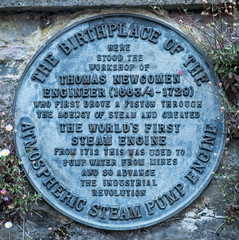Thomas Newcomen
Commemorated on 3 plaques
This is the site of the house where Thomas Newcomen lived when he built his famous engines.
Lower Street, Dartmouth, United Kingdom where they lived
Near this spot the world's first successful working steam engine was erected in 1712 by Thomas Newcomen 1663-1729 to pump water from the Coneygree Coalworks. A full size replica of the engine has been built at the Black Country Museum.
Coneygree Arts Centre, Sedgley Road East, Tipton, United Kingdom where they worked near
The birthplace of the Atmospheric Steam Pump Engine Here stood the workshop of Thomas Newcomen Engineer (1663/4-1729) who first drove a piston through the agency of steam and created the world's first steam engine From 1712 this was used to pump water from the mines and so advance the Industrial Revolution
Lower Street, Dartmouth, United Kingdom where they was



